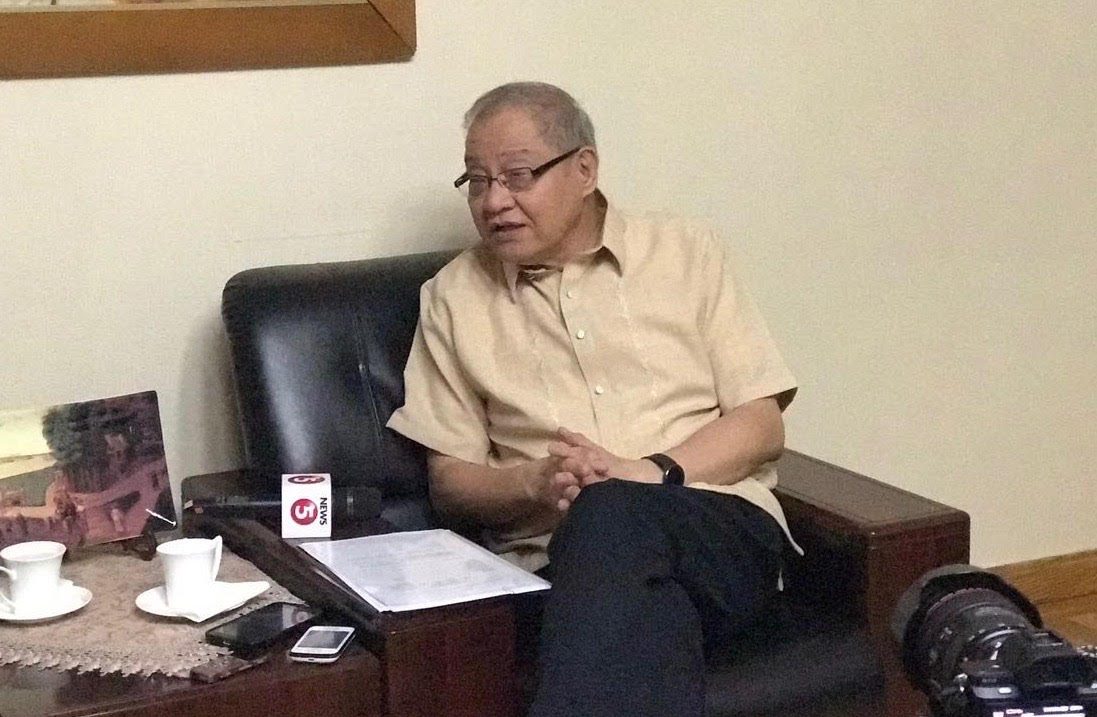SUMMARY
This is AI generated summarization, which may have errors. For context, always refer to the full article.

BEIJING, China – A year after it won its landmark case against China, the Philippines under President Rodrigo Duterte has grown closer to the regional giant, sparking fears that this may compromise its claim in the West Philippine Sea (South China Sea).
Philippine Ambassador to China Jose Santiago Sta Romana sought to allay such concerns, asserting the administration’s position that the country only stands to gain from its friendlier stance toward China.
“I certainly don’t agree. No, because what we are trying to do is not to give us the claims and yet develop relations. And this is the goal of the Duterte administration and if you look at it, I don’t think we have lost an inch of territory. I think we gained,” Sta Romana told reporters at the Philippine Embassy on Tuesday, July 11.
In 2016, the Permanent Court of Arbitration in The Hague, the Netherlands favored the Philippines in its dispute with China. China, which did not recognize nor participate in the arbitration proceedings initiated by the administration of President Benigno Aquino III, has refused to accept the ruling.
Duterte has since taken a softer stance toward the Asian giant and opted not to raise the controversial issue with China, in exchange for funding assistance for his ambitious infrastructure program and more investments and trade with that country.
To push his point, Sta Romana said the Philippines used to have no access to disputed waters and islands, such as Scarborough and Ayungin shoals. But when Duterte came in and forged good ties with China, Filipino fishermen were allowed to fish in these areas.
“Whereas before we didn’t have access to the Scarborough Shoal, now we have access. Before there were fears that the Chinese will reclaim Scarborough Shoal now the Chinese are saying they won’t build.” the ambassador said.
“So I don’t think we’ve lost an inch of territory, we have gained what we lost for so many years. We have regained some of the features or areas we don’t have access to. So I think basically what we are trying to do is hopefully through this approach is not only to defend what we have but to preserve what we have and if possible to regain what we have lost in the past,” Sta Romana added.
Earlier reports, however, found that China is building monitoring stations on 6 islands and reefs, including Scarborough Shoal.
Defense Secretary Delfin Lorenzana also confirmed in a forum with journalists in March that it was the US that persuaded China to stop its plan to build on Scarborough Shoal last year.
Why Duterte’s pivot to China?
Asked for the President’s reasons for shifting alliance to China, the envoy said the latter won’t budge despite the ruling.
He also said that the United States could not guarantee that it would back the Philippines in case of extreme scenarios, though Washington had reiterated its “ironclad commitment” to the Philippines on several occasions as tensions built up in the disputed area during the previous administration.
“The Chinese position was so strong they will not accept it. Another one is the American position was not very strong. They did not guarantee that if something happens they will back you out. So he had to think what was the best way to proceed,” Sta Romana said.
In 2016, Duterte sent former president Fidel Ramos to Hong Kong to talk with China.
It was then that the Asian giant signified its intent to create temporary “practical agreements” with the Philippines, pending the resolution of the underlying sovereignty issue.
“For China to accept the award before improvement of relations, nothing will happen. Our relations will be frozen if both sides will not budge. It will be frozen forever,” Sta Romana said.
“So the idea was you still discuss the disputes but you separate it from areas where there are no disputes and don’t allow it to be an obstacle to the development of relations,” he added.
Learning from history: Don’t be hard on China
Citing history, the Philippine envoy said there was no point in dealing with China head on.
This, he said, was the mistake of the past, an apparent reference to the Aquino administration which brought China to court.
“I think this was the shortcoming in the past. If you deal with China in a hard way, in a hardball manner, you will face the same equally hard, if not harder approach from the Chinese. This is an important lesson from history,” he said
The keys to negotiating with China, he added, are “preparation, strategic patience, and a good negotiating team.”
“Because the Chinese they negotiate very seriously and it takes time, they will try to outlast you if possible. But if you try to force an issue it will result in the escalation of tension, and possibly conflict as we have known from history in the past 30 years,” he said.
Echoing Duterte’s stance, Sta Romana reiterated that the county should differentiate its bilateral differences from China from its actual bilateral relations.
“Because if you combine it, as I think we did from the past couple of years, at least it gave an impression that we did when the Chinese were accusing us of being a proxy for the US or being a trojan horse of the rebalance strategy. And in that case, it complicates the whole issue,” he said. – Rappler.com
Add a comment
How does this make you feel?
There are no comments yet. Add your comment to start the conversation.